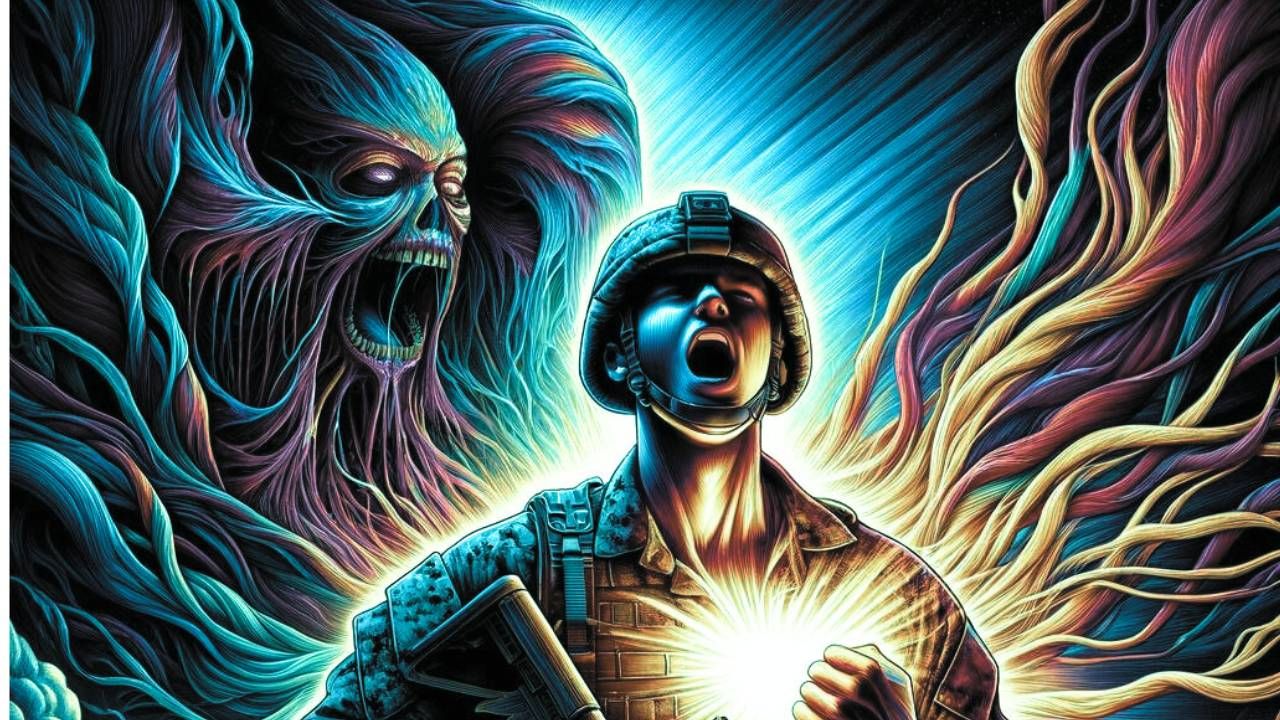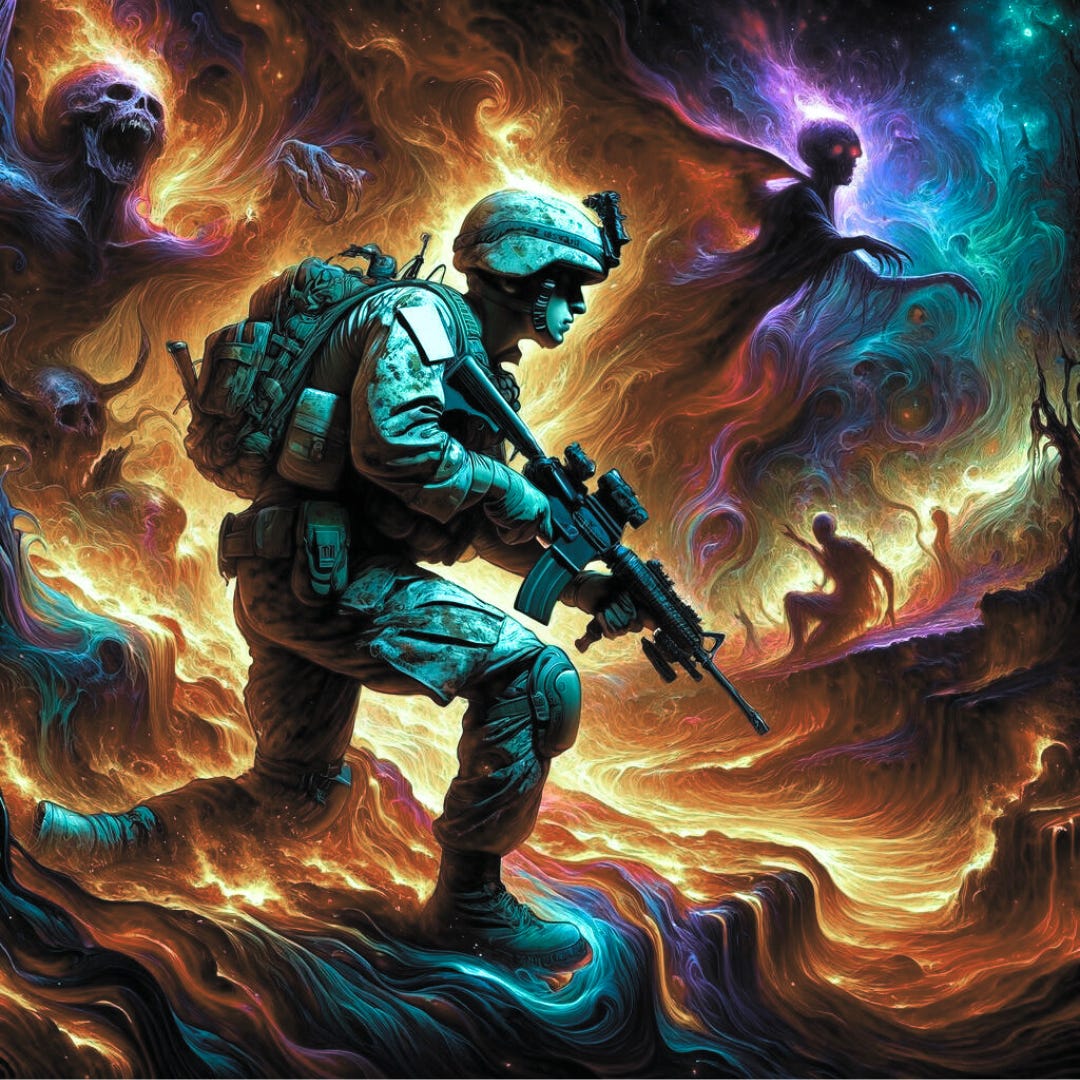Navigating the Shadows: Understanding and Healing Moral Injury in Veterans
Feb 07, 2024
Shadows of War: Confronting the Moral Abyss
In the fading light of a war-torn day in Iraq, I stood at a checkpoint, weapon in hand, a young Marine charged with making split-second decisions in the chaos of battle. The rules of engagement were clear, yet nothing could prepare me for the moral precipice on which I was about to stand.
An orange and white taxi cab, an ordinary sight turned ominous, sped towards our position. The protocol was to engage if it breached the Constantine wire, a barrier meant to protect but also a line that, once crossed, demanded the most harrowing of actions. As the vehicle tore through the defenses without slowing, we opened fire. The aftermath would reveal a reality far removed from any drill or scenario I had ever known.
As we approached the vehicle, the true cost of war revealed itself in the most heart-wrenching manner. Inside were not just the combatants we anticipated but two young children, innocent lives caught in the crossfire of a conflict they could not comprehend. The agony in their cries, the confusion, and the fear in their eyes are images that time cannot erase. In a desperate bid to save the young boy, I found myself in the back of a medevac vehicle, racing against the odds, performing chest compressions on a life slipping away beneath my hands.
But in that eerie darkness, amidst the smell of diesel and gunpowder, I was not just battling for the boy's life; I was also confronting the very essence of my own. The realization that he was gone, despite my desperate attempts, was a blow not just to my heart but to my soul. As I stepped out of the vehicle, covered in his blood, I was met not with the relief of survival but with the crushing weight of guilt and self-doubt. Questions haunted me, piercing through the fog of war mercilessly. "Had I just killed two innocent children? What about their families?" The pain of these unanswerable questions marked the beginning of a battle I was ill-prepared to fight, one within the confines of my mind.
As I collapsed into tears that day, I left a part of myself in that war-torn city. It marked the onset of a moral injury, a wound not visible but one that would dictate my existence for the next two decades. It was a moment of profound transformation, a crossing from one realm of being into another, where the concepts of right and wrong, heroism and horror, were no longer distinct but hopelessly entangled.
In this introduction to our journey through the landscape of moral injury, we begin to unravel the intricate fabric of these invisible battlefronts. It's a path lined with questions of ethics, humanity, and the cost of actions made in moments that ask more of us than we ever imagined possible. As we venture deeper, we seek not just understanding but also pathways to healing, compassion, and, ultimately, a reconciliation with the parts of ourselves forever altered by the crucible of war.
The Invisible Battlefront
The concept of moral injury, while only recently defined in modern psychological terms, is a profound and age-old affliction that has silently shaped the lives of countless warriors throughout history. Its roots stretch back to the earliest civilizations, with ancient texts and accounts recognizing the profound psychological and spiritual wounds inflicted by the ravages of war. Characters in classical literature, such as Achilles in Homer's "Iliad," display behaviors and turmoil that today's scholars identify as indicative of moral injury. These ancient societies were aware of the impact of war on the warrior's spirit and moral fiber, often instituting transition periods and rituals to help warriors reconcile with society and themselves upon their return from battle.
As time progressed, the understanding and terminology surrounding the psychological impact of combat evolved. Historical terms like "service member's heart," "shell shock," and "combat fatigue" have all, in various ways, attempted to describe aspects of the profound moral and psychological effects of war on service members. However, it was only in the late 20th and early 21st centuries that significant advancements in psychological research led to a more comprehensive understanding of combat-related psychological conditions. The recognition of post-traumatic stress disorder (PTSD) marked a significant advancement. Yet, it soon became evident that PTSD alone could not encapsulate the entire spectrum of a service member's psychological and moral turmoil.
This gap in understanding led to the introducing of the term "moral injury." Pioneered by psychiatrists such as Jonathan Shay and Brett Litz, this term was coined to specifically address the damage inflicted on one's moral conscience due to perpetrating, witnessing, or failing to prevent acts that transgress deeply held moral beliefs. Unlike physical wounds or general stress reactions, moral injury hits the core of an individual's moral foundation, often leading to profound internal conflict, guilt, and existential crises.
In contemporary times, awareness and research into moral injury have surged. Healthcare professionals, veterans' organizations, and scholars acknowledge its existence and actively explore the concept, its implications, and strategies for healing and support. Moreover, various religious and philosophical traditions have engaged with the moral dilemmas of war, offering rich insights into the human struggle with guilt, sin, and the quest for redemption and forgiveness—central to comprehending and addressing moral injury.
As we delve deeper into this topic, it's crucial to recognize that moral injury represents an invisible battlefront that countless veterans navigate long after the physical battles have ceased. It's a complex interweaving of personal ethics, cultural values, and the harsh realities of combat—a topic that demands our understanding, empathy, and concerted efforts toward healing.

Unpacking Moral Injury
My quest to grasp the depths of moral injury guided me toward the enlightening works of Pulitzer Prize-winning journalist David Wood, esteemed philosopher Nancy Sherman, and pioneering psychiatrist Jonathan Shay. Their contributions have been instrumental in shaping my understanding and approach to this often-overlooked aspect of veteran well-being.
In "What Have We Done: The Moral Injury of Our Longest Wars," David Wood offers a deep dive into the emotional, psychological, social, and physical ramifications of moral injury on those who have served. His thorough analysis illuminates the intricate ways in which moral injury influences the lives of service members and veterans, providing essential insights for veterans themselves, as well as for therapists and families. It underscores the critical need to acknowledge moral injury as a unique and multifaceted condition, demanding our attention and empathy.
The Emotional and Psychological Impact of Moral Injury
Guilt and Shame: Service members often suffer intense guilt and shame from actions or inactions conflicting with their moral code. The emotional turmoil is profound, whether it's unintentional harm to civilians, failing to save a comrade, or following morally questionable orders.
Spiritual Turmoil: Moral injury can spark a spiritual crisis, raising existential questions about beliefs, actions, and the nature of good and evil. This turmoil often manifests as betrayal and losing faith in previously held values.
Emotional Numbness and Detachment: As a coping mechanism, individuals may become emotionally numb, detaching themselves from their emotions, which hinders their ability to connect with others and enjoy life.
Social and Relational Impact
Isolation and Withdrawal: The weight of guilt and shame may lead to social withdrawal, leaving individuals feeling lonely and misunderstood.
Strained Relationships: Behavioral changes and emotional shifts due to moral injury can stress relationships with loved ones, as veterans struggle with feelings of disconnection and the belief that others can't understand their experiences.
Behavioral and Physical Impact
Substance Abuse: To escape painful memories or emotional distress, some turn to substance abuse, leading to addiction and complicating recovery.
Risky Behaviors: Risk-taking or self-destructive actions can emerge as a response to guilt, serving as self-punishment or a desperate attempt to feel alive amidst emotional numbness.
Long-Term Consequences
Mental Health Disorders: Moral injury can lead to or exacerbate mental health conditions like depression, anxiety, and PTSD, creating a complex web of psychological challenges.
Suicidal Ideation and Attempts: The overwhelming despair and internal conflict can lead to thoughts of suicide driven by feelings of worthlessness and perceived unforgivability.

Journey Forward: From Understanding to Healing Moral Injury
In this initial installment of our three-part exploration into moral injury, we've embarked on a poignant journey through the shadowy realms of the human psyche, where battle scars extend far beyond the physical. This exploration has set the stage for a deeper inquiry into the personal aftermath of moral injury, where the second part of our series will navigate the turbulent waters of ethical dilemmas, the erosion of identity, and the quest for self-reconciliation.
As we continue, we will explore not only the darkened corridors of struggle but also the pathways toward healing, inviting innovative interventions like psychedelic-assisted therapy and traditional therapeutic approaches. The concluding segment will offer vital insights and guidance for therapists and clinicians, aiming to bridge understanding and foster a supportive framework for healing. Join me as we continue to unravel the complex tapestry of moral injury, seeking light within the darkness and hope amidst despair.
Stay connected with The Wounded Healer's Path Newsletter!
🔥 Join Us Around The Fire - Every Voice Matters 🔥
Storytelling isn’t just about recounting the past; it’s a profound way to pass down wisdom, preserve values, and navigate present challenges. These shared narratives give us the strength to heal, grow, and effect real change.
Be a part of this growing community. Sign up for our newsletter and dive into these powerful conversations that can help you transform your life. Let’s rekindle the fire of communal wisdom and storytelling, guiding each other toward a brighter future.
We hate SPAM. We will never sell your information, for any reason.
